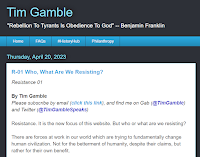By Tim Gamble
September is National Preparedness Month. In recognition of that, I've posted a long series of articles aimed mostly at people relatively new to preparedness, or who just need a good review of the subject matter. Here is the index of those 21 articles:
Outline of Preparedness https://www.dystopiansurvival.com/2024/09/preparedness-month-outline-of.html
FOOD! https://www.dystopiansurvival.com/2024/09/food-national-preparedness-month.html
The Truth About Expiration Dates https://www.dystopiansurvival.com/2024/09/the-truth-about-expiration-dates.html
WATER!!! https://www.dystopiansurvival.com/2024/09/water-national-preparedness-month.html
Water Collection and Treatment https://www.dystopiansurvival.com/2024/09/water-collection-and-treatment-national.html
Situational Awareness and the OODA Loop https://www.dystopiansurvival.com/2024/09/situational-awareness-and-ooda-loop.html
Home Security https://www.dystopiansurvival.com/2024/09/home-security-national-preparedness.html
Personal Security https://www.dystopiansurvival.com/2024/09/personal-security-national-preparedness.html
Your Vehicles https://www.dystopiansurvival.com/2024/09/your-vehicles-national-preparedness.html
The Bug Out Plan https://www.dystopiansurvival.com/2024/09/the-bug-out-plan-national-preparedness.html
Family Communications Plan https://www.dystopiansurvival.com/2024/09/family-communications-plan-national.html
No Electricity? https://www.dystopiansurvival.com/2024/09/no-electricity-national-preparedness.html
Personal Finance https://www.dystopiansurvival.com/2024/09/personal-finance-national-preparedness.html
Training https://www.dystopiansurvival.com/2024/09/training-national-preparedness-month.html
Your Body https://www.dystopiansurvival.com/2024/09/your-body-national-preparedness-month.html
Fitness and the Aging Prepper https://www.dystopiansurvival.com/2024/09/fitness-and-aging-prepper-national.html
10 FREE Ways To Improve Your Health and Fitness https://www.dystopiansurvival.com/2024/09/10-free-ways-to-improve-your-health-and.html
Make Plans For a Long-Term Emergency https://www.dystopiansurvival.com/2024/09/make-plans-for-long-term-emergency.html
Nuclear War Preparations https://www.dystopiansurvival.com/2024/09/nuclear-war-preparations-national.html
Civil Defense https://www.dystopiansurvival.com/2024/09/civil-defense-national-preparedness.html
Community https://www.dystopiansurvival.com/2024/09/community-national-preparedness-month.html
FOOD! https://www.dystopiansurvival.com/2024/09/food-national-preparedness-month.html
The Truth About Expiration Dates https://www.dystopiansurvival.com/2024/09/the-truth-about-expiration-dates.html
WATER!!! https://www.dystopiansurvival.com/2024/09/water-national-preparedness-month.html
Water Collection and Treatment https://www.dystopiansurvival.com/2024/09/water-collection-and-treatment-national.html
Situational Awareness and the OODA Loop https://www.dystopiansurvival.com/2024/09/situational-awareness-and-ooda-loop.html
Home Security https://www.dystopiansurvival.com/2024/09/home-security-national-preparedness.html
Personal Security https://www.dystopiansurvival.com/2024/09/personal-security-national-preparedness.html
Your Vehicles https://www.dystopiansurvival.com/2024/09/your-vehicles-national-preparedness.html
The Bug Out Plan https://www.dystopiansurvival.com/2024/09/the-bug-out-plan-national-preparedness.html
Family Communications Plan https://www.dystopiansurvival.com/2024/09/family-communications-plan-national.html
No Electricity? https://www.dystopiansurvival.com/2024/09/no-electricity-national-preparedness.html
Personal Finance https://www.dystopiansurvival.com/2024/09/personal-finance-national-preparedness.html
Training https://www.dystopiansurvival.com/2024/09/training-national-preparedness-month.html
Your Body https://www.dystopiansurvival.com/2024/09/your-body-national-preparedness-month.html
Fitness and the Aging Prepper https://www.dystopiansurvival.com/2024/09/fitness-and-aging-prepper-national.html
10 FREE Ways To Improve Your Health and Fitness https://www.dystopiansurvival.com/2024/09/10-free-ways-to-improve-your-health-and.html
Make Plans For a Long-Term Emergency https://www.dystopiansurvival.com/2024/09/make-plans-for-long-term-emergency.html
Nuclear War Preparations https://www.dystopiansurvival.com/2024/09/nuclear-war-preparations-national.html
Civil Defense https://www.dystopiansurvival.com/2024/09/civil-defense-national-preparedness.html
Community https://www.dystopiansurvival.com/2024/09/community-national-preparedness-month.html
----------------------------------
Ad: Gas Can Spout Replacement Kit, 5 pack (Amazon Link) - An answer to those modern gas cans that spill gas all over the place - a return to normal spouts that actually worked.











